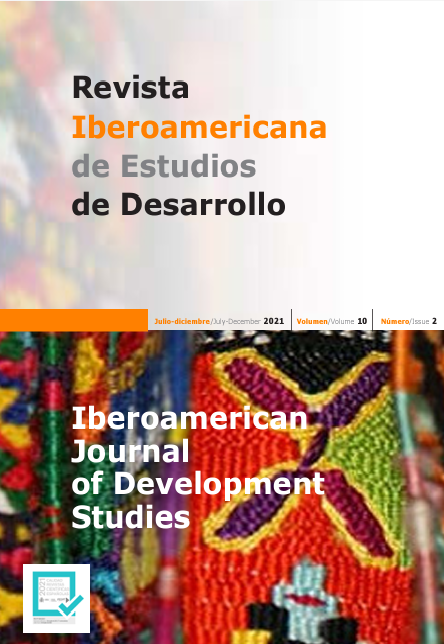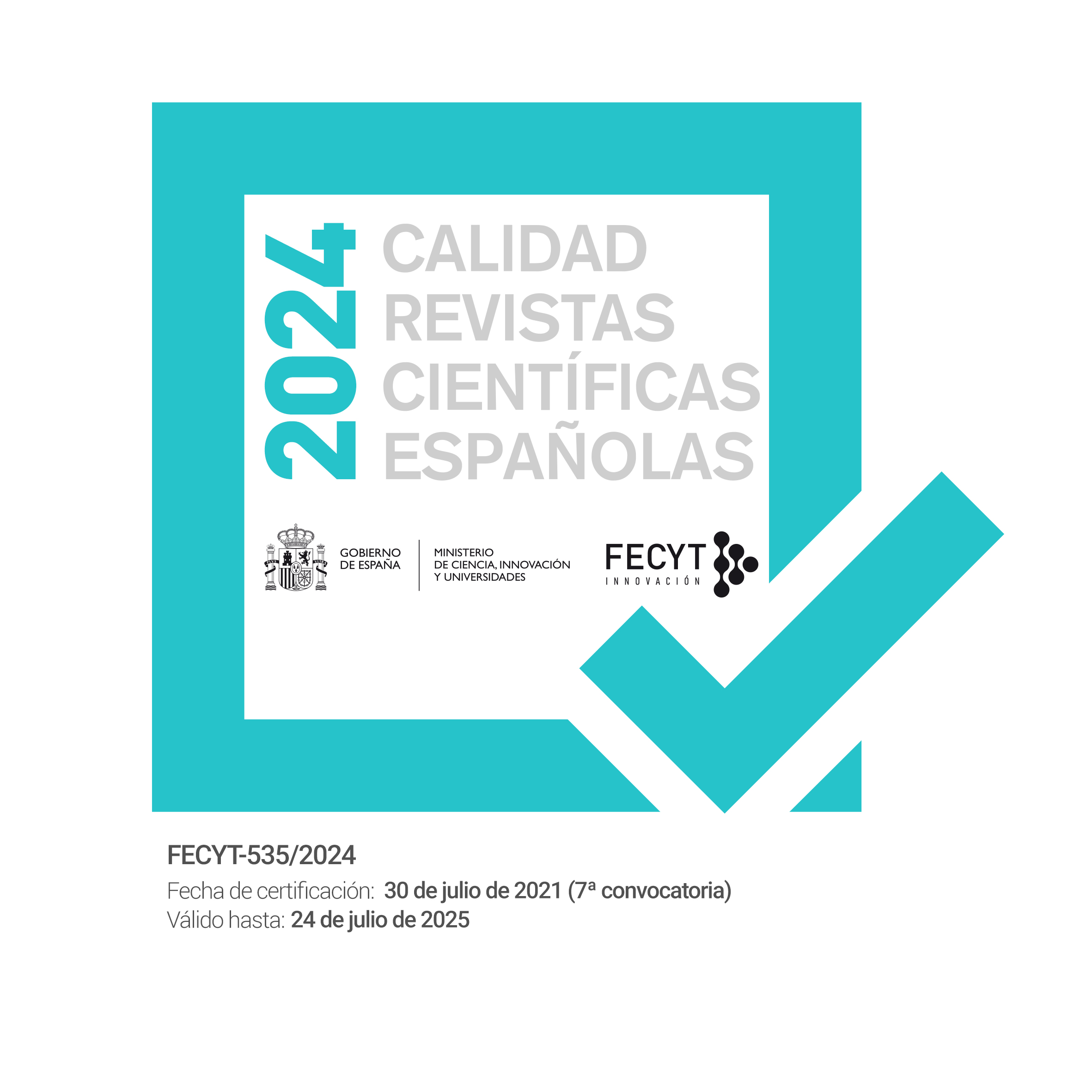Agricultural cooperatives’ contribution to territorial development: findings from cases in Chile and Uruguay
DOI:
https://doi.org/10.26754/ojs_ried/ijds.554Keywords:
cooperatives, agriculture, territorial development, Chile, UruguayAbstract
Agricultural cooperatives are a deeply rooted phenomenon in Latin America, while territorial development is increasingly present in public policies and in communities’ strategies. This article
aims to analyze the practices and visions of the members of two agricultural cooperatives in Chile and Uruguay, on the basis of a conceptual framework drawn up, to identify the contribution of agricultural
cooperatives to territorial development in four dimensions: productive, social-community, political-institutional, and participation-mobilization. The Uruguayan case shows a cooperative more committed to the development of its territory; while, in the Chilean case, the relationship with
the community is more indirect and based on the approach of the «trickle-down» effect. These results must be interpreted considering the different institutional contexts and related public policies
in each case. The latter opens an interesting research agenda on the relations between agricultural cooperatives, territorial development, and public policies.
Downloads
References
ALBURQUERQUE F (2015). El enfoque del desarrollo económico territorial. En: Costamagna P, Pérez Rozzi S (eds.). Enfoque, estrategias e información para el desarrollo territorial. Los aprendizajes de ConectaDEL, Buenos Aires, pp. 15-44.
ALIANZA COOPERATIVA INTERNACIONAL (2018). Principios y valores cooperativos. https://www.ica.coop/es/cooperativas/identidad-alianza-cooperativa-internacional?_ga=2.265726923.510882579.1582228624-1666397132.1577987075, acceso 10 enero de 2020.
AROCENA J, MARSIGLIA J (2017). La escena territorial del desarrollo: actores, relatos y políticas. Taurus, Montevideo (Uruguay).
AYDALOT P (1986). 1986, Milieux innovateurs en Europe. GREMI, París.
BECATTINI G (2006). Vicisitudes y potencialidades de un concepto: el distrito industrial. Economía industrial 359:21-27.
BERTULLO J, ISOLA G, CASTRO D, SILVEIRA M (2003). El cooperativismo en Uruguay. En: Procesos Asociativos (PROAS) Unidad de Estudios Cooperativos, Montevideo (Uruguay).
BOGLIACCINI JA (2019). The reconstruction of business interests after the ISI collapse: unpacking the effect of institutional change in Chile and Uruguay. Third World Quarterly 40(7):1378-1393. https://doi.org/10.1080/01436597.2018.1561181, acceso 20 de febrero de 2020.
BOISIER S (1993). Desarrollo regional endógeno en Chile. ¿Utopía o necesidad? Ambiente y desarrollo 9(2):42-45.
BOSC PM, SOURISSEAU JM, BONNAL P, GASSELIN P, VALETTE É, BELIERES JF (2018). Diversity of Family Farming Around the World. En: Diversity of Family Farming Around the World: Existence, Transformations and Possible Futures of Family Farms. https://doi.org/10.1007/978-94-024-1617-6_1, acceso 20 de febrero de 2020.
BRUGGER S, DÁVILA M (2013). Las cooperativas agrícolas ecológicas como motor del desarrollo sustentable. Un estudio neo-institucionalista de las cooperativas coreanas Hansalim e Icoop en Corea del Sur. Revista Académica PROCOAS-AUGM 1(5):25-53.
BUENDÍA-MARTÍNEZ I, CÔTÉ A (2014). Desarrollo territorial rural y cooperativas: un análisis desde las políticas públicas. Cuadernos de Desarrollo Rural 11(74):35-54.
CASTIGLIONI R (2018). Determinants of Policy Change in Latin America: A Comparison of Social Security Reform in Chile and Uruguay (1973-2000). Journal of Comparative Policy Analysis: Research and Practice 20(2):176-192. https://doi.org/10.1080/13876988.2016.1227526, acceso 12 de mayo de 2020.
CEPAL (2017). Panorama del desarrollo territorial en América Latina y el Caribe, 2017. Santiago (Chile).
CEPAL (2019a). Planificación para el desarrollo territorial sostenible en América Latina y el Caribe. https://repositorio.cepal.org/bitstream/handle/11362/44731/1/S1900439_es.pdf, acceso 20 de marzo de 2020.
CEPAL (2019b). Enfoque territorial y análisis dinámico de la ruralidad: alcances y límites para el diseño de políticas de desarrollo rural innovadoras en América Latina y el Caribe. https://www.cepal.org/es/publicaciones/44905-enfoque-territorial-analisis-dinamico-la-ruralidad-alcances-limites-diseno , acceso 20 de marzo de 2020.
CEPAL (2019c). Panorama Social de América Latina. https://www.cepal.org/es/publicaciones/44969-panorama-social-america-latina-2019, acceso 20 de marzo de 2020.
CHARMAZ K (2006). Constructing grounded theory: a practical guide through qualitative analysis. SAGE, Londres.
FAO (2015). The State of Food and Agriculture 2015 (SOFA): Social Protection and Agriculture: Breaking the Cycle of Rural Poverty. http://www.fao.org/3/a-i4910e.pdf, acceso 10 de abril de 2020.
FAO (2017). The State of Food and Agriculture Leveraging Food Systems for Inclusive Rural Transformation. http://www.fao.org/3/a-i7658e.pdf , acceso 20 de enero de 2020.
FERRÉS J, PASTORINI M, MARTÍ JP (2010). Los procesos de integración regional y de globalización en el cooperativismo agrario del Uruguay. Revista Estudios Cooperativos 13(1):37.
GARCÍA-GARCÍA, FDB (2017). Debate sobre la inclusión del cooperativismo dentro de las políticas de la nueva ruralidad en América Latina. Panorama Económico 23(3):357-380.
GAUDIN Y (2019). Nuevas narrativas para una transformación rural en América Latina y el Caribe. La nueva ruralidad: conceptos y medición. Documentos de Proyectos (LC/TS.2019/45-LC/MEX/TS.2019/9). Cepal, Ciudad de México.
GLASER BG, HOLTON J (2004). Remodeling Grounded Theory. Forum Qualitative Sozialforschung/Forum: Qualitative Social Research 5(2). https://doi.org/10.17169/FQS-5.2.607, acceso 4 de enero de 2020.
GRAEUB BE, CHAPPELL MJ, WITTMAN H, LEDERMANN S, KERR RB, GEMMILL-HERREN B (2016). The State of Family Farms in the World. World Development 87:1-15. https://doi.org/10.1016/J.WORLDDEV.2015.05.012, acceso 10 de enero de 2020.
GUILLÉN R, SAMPER M, GÓMEZ M (2010). Estrategia Centroamericana de Desarrollo Rural Territorial 2010-2030: ECADERT. https://www.sica.int/documentos/estrategia-centroamericana-de-desarrollo-rural-territorial-ecadert_1_80566.html , acceso 12 de enero de 2020.
MAGRI A, ABRAHAN M, OGUES L (coords.) (2015). Nuevos desafíos y respuestas de los actores sobre el desarrollo local. La Paloma y Nueva Palmira frente a propuestas de inversión. Espacio Interdisciplinario de la Universidad de la República, Montevideo (Uruguay).
MARTÍ JP (2011). Legislación y fomento del cooperativismo en Uruguay. Esfuerzos espasmódicos, fragmentarios y reactivos. Revista de Estudios Cooperativos 16(2):10-26.
MÉNDEZ R (2006). La construcción de redes locales y los procesos de innovación como estrategias de desarrollo rural. Problemas del desarrollo 37(147):217-240.
MINISTERIO DE AGRICULTURA (2019). Asociatividad y Cooperativismo Moderno. https://www.infor.cl/images/pdf/Seminario_Asociatividad_mar.2019/Asociatividad_y_Cooperativismo_Moderno.pdf , acceso 20 abril 2020.
NAYAN P, ENCALADA D, SERÓN F (2012). Situación actual del cooperativismo agropecuario en Chile, p. 87. http://fidamercosur.org/claeh/images/BIBLIOTECA/FaseIII_2012/Noviembre/SeminarioChile/SITUACIN%20ACTUAL%20DEL%20COOPERATIVISMO%20AGROPECUARIO%20EN%20CHILE%202012.pdf , acceso 10 enero de 2020.
OIT (2012). El cooperativismo en América Latina. https://www.ilo.org/wcmsp5/groups/public/---americas/---ro-lima/documents/publication/wcms_188087.pdf , acceso 2 de septiembre 2020.
QUINTANA A (2006). Metodología de Investigación Científica Cualitativa. En: Quintana A, Montgomery W (eds.). Psicología: Tópicos de actualidad. UNMSM, Lima, pp. 47-84.
RADRIGÁN MH, DÁVILA AM, PENAGLIA FE (2012). Gestión y liderazgos en los emprendimientos sociales: el caso del sector no lucrativo chileno. Polis, vol. 11 32:141-165.
RODRÍGUEZ-POSE A (2013). Do institutions matter for regional development? Regional Studies 47(7):1034-1047.
RODRÍGUEZ WEBER JE (2016). Desigualdad y desarrollo en Chile: historia comparada de la desigualdad en Chile y Uruguay. https://www.undp.org/content/dam/chile/docs/pobreza/undp_cl_pobreza_Serie-DT_1.pdf , acceso 20 de abril de 2020.
SALAZAR S (2017). The Creation and Distribution of Benefits in Cooperatives: Some Comparative Findings. En: Sánchez C, Vuotto M, Sarria A (eds.). Review of International Co-operation, vol. 104. International Co-operative Alliance, Bruselas (Bélgica), pp 135-147.
SÁNCHEZ-ANCOCHEA D (2020). Beyond a Single Model: Explaining Differences in Inequality within Latin America. Helen Kellogg Institute for International Studies.
SCHEJTMAN A, BERDEGUÉ JA (2004). Desarrollo territorial rural. https://www.rimisp.org/wp-content/files_mf/1363093392schejtman_y_berdegue2004_desarrollo_territorial_rural_5_rimisp_CArdumen.pdf , acceso 10 de marzo de 2020.
SCHETTINI P, CORTAZZO I (2015). Análisis de datos cualitativos en la investigación social. Procedimientos y herramientas para la interpretación de información cualitativa. Edulp, Universidad Nacional de la Plata.
SEGURA Ó, CÉSPEDES JC (2017). Contributions from Cooperatives to Development: Methodological Input for Awareness of the Cooperative Phenomenon. En: Sánchez C, Vuotto M, Sarria A (eds.). Review of International Co-operation, vol. 104. International Co-operative Alliance, Bruselas (Bélgica), pp 148-161.
TOMANEY J, PIKE A, RODRÍGUEZ-POSE A (2011). Local and regional development. Reflections and futures. En: Pike A, Rodríguez-Pose A, Tomaney J (eds.). Handbook of Local and Regional Development, Routledge (Londres), pp. 618-630.
VÁSQUEZ-LEÓN M, BURKE B, FINAN T (eds.) (2017). Cooperatives, Grassroots Development, and Social Change: Experiences from Rural Latin America. University of Arizona Press.
VÁZQUEZ BARQUERO A (1988). Desarrollo local. Una estrategia de creación de empleo. Pirámide, Madrid.
VÁZQUEZ BARQUERO A (2005). Las nuevas fuerzas del desarrollo. Antoni Bosch Editor, Barcelona.
VÁZQUEZ BARQUERO A (2018). Reflexiones teóricas sobre la relación entre desarrollo endógeno y economía social. Revista Iberoamericana de Economía Solidaria e Innovación Socioecológica 1:11-22.
VÁZQUEZ BARQUERO A, RODRÍGUEZ-COHARD JC (2016). Endogenous development and institutions: Challenges for local development initiatives. Environment and Planning C: Government and Policy 34(6):1135-1153.
Downloads
Published
How to Cite
Issue
Section
License
Copyright (c) 2021 Adrián Rodríguez-Miranda, Sofía Boza, Aracely Núñez

This work is licensed under a Creative Commons Attribution-NonCommercial-NoDerivatives 4.0 International License.








